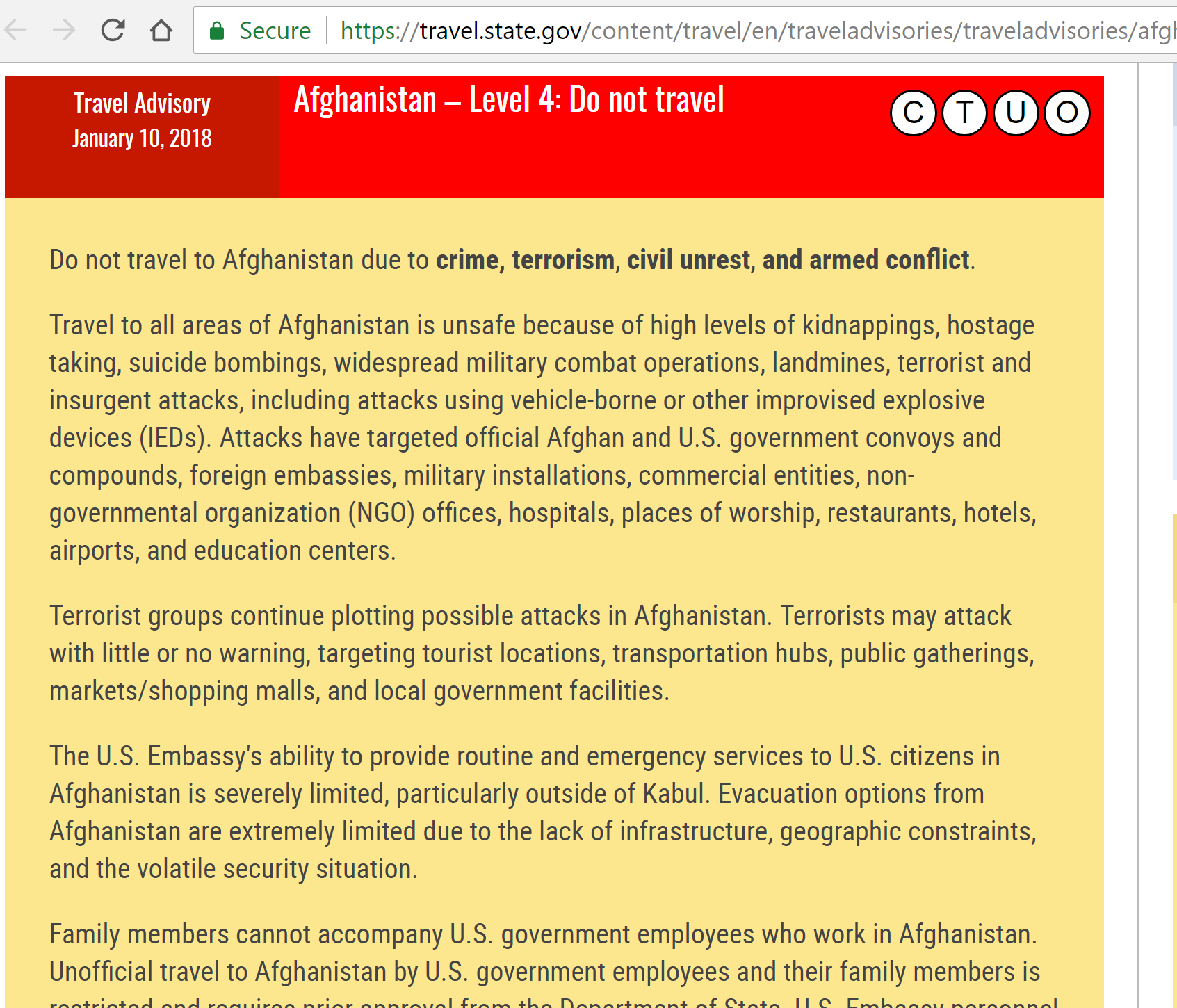
Do not travel to Afghanistan due to crime, terrorism, civil unrest, and armed conflict
Reading time: (Number of words: )
U.S. official Travel Advisories
Do not travel to Afghanistan due to crime, terrorism, civil unrest, and armed conflict.
Travel to all areas of Afghanistan is unsafe because of high levels of kidnappings, hostage taking, suicide bombings, widespread military combat operations, landmines, terrorist and insurgent attacks, including attacks using vehicle-borne or other improvised explosive devices (IEDs). Attacks have targeted official Afghan and U.S. government convoys and compounds, foreign embassies, military installations, commercial entities, non-governmental organization (NGO) offices, hospitals, places of worship, restaurants, hotels, airports, and education centers.
Terrorist groups continue plotting possible attacks in Afghanistan. Terrorists may attack with little or no warning, targeting tourist locations, transportation hubs, public gatherings, markets/shopping malls, and local government facilities.
The U.S. Embassy’s ability to provide routine and emergency services to U.S. citizens in Afghanistan is severely limited, particularly outside of Kabul. Evacuation options from Afghanistan are extremely limited due to the lack of infrastructure, geographic constraints, and the volatile security situation.
Family members cannot accompany U.S. government employees who work in Afghanistan. Unofficial travel to Afghanistan by U.S. government employees and their family members is restricted and requires prior approval from the Department of State. U.S. Embassy personnel are restricted from traveling to all locations in Kabul except the U.S. Embassy and other U.S. government facilities unless there is a compelling U.S. government interest in permitting such travel that outweighs the risk. Additional security measures are needed for any U.S. government employee travel and movement through Afghanistan.
Due to risks to civil aviation operating within or in the vicinity of Afghanistan, the Federal Aviation Administration (FAA) has issued a Notice to Airmen (NOTAM) and/or a Special Federal Aviation Regulation (SFAR). For more information, U.S. citizens should consult the Federal Aviation Administration’s Prohibitions, Restrictions and Notices.
Read the Safety and Security section on the country information page.
If you decide to travel to Afghanistan:
Visit our website for Travel to High-Risk Areas.
Draft a will and designate appropriate insurance beneficiaries and/or power of attorney.
Discuss a plan with loved ones regarding care/custody of children, pets, property, belongings, non-liquid assets (collections, artwork, etc.), funeral wishes, etc.
Share important documents, login information, and points of contact with loved ones so that they can manage your affairs, if you are unable to return as planned to the United States. Find a suggested list of such documents here.
Establish your own personal security plan in coordination with your employer or host organization, or consider consulting with a professional security organization.
Enroll in the Smart Traveler Enrollment Program (STEP) to receive Alerts and make it easier to locate you in an emergency.
Follow the Department of State on Facebook and Twitter.
Review the Crime and Safety Report for Afghanistan.
U.S. citizens who travel abroad should always have a contingency plan for emergency situations. Review the Traveler’s Checklist.

Poems for the Hazara
The Anthology of 125 Internationally Recognized Poets From 68 Countries Dedicated to the Hazara
Order Now








